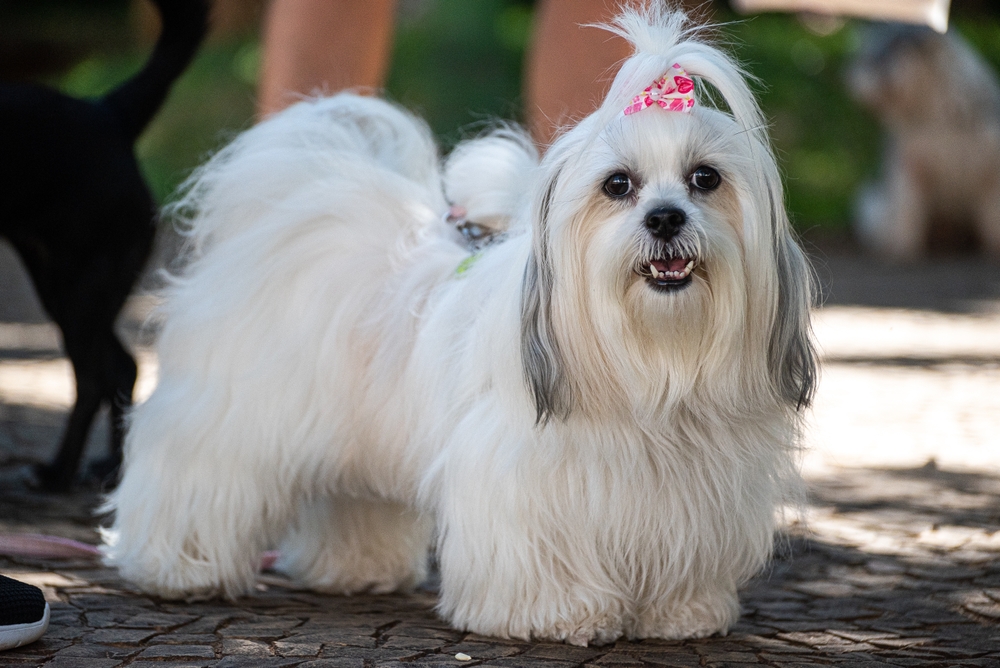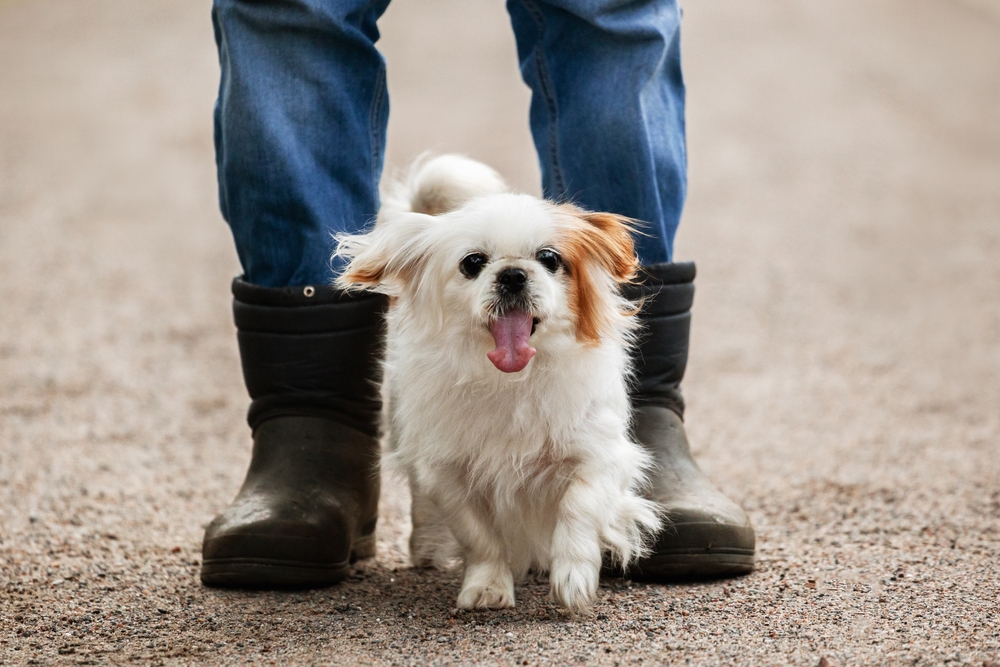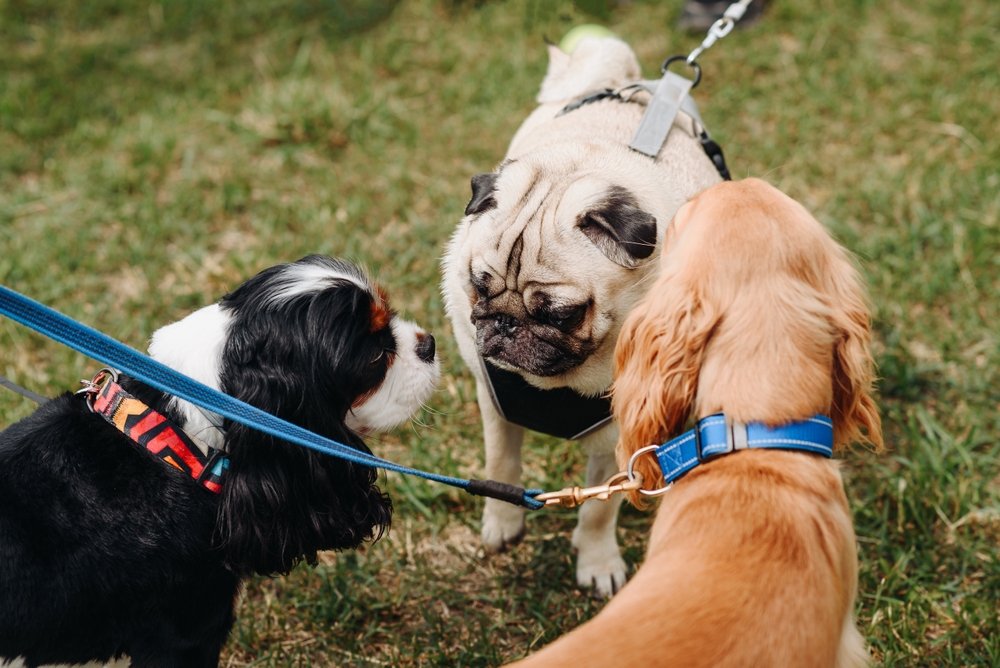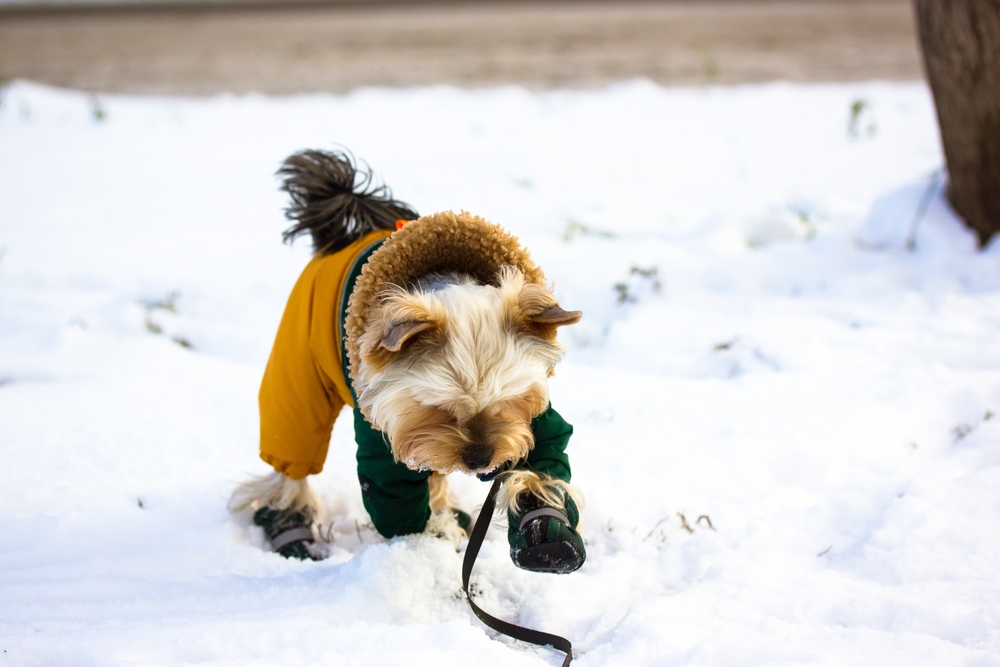Planning a hiking trip with your furry friend? While some dogs are perfect for the trails, others might not share your enthusiasm for the great outdoors. Before you hit the path, it’s essential to consider your dog’s breed and their natural inclinations. Not every dog is built for long hikes, and choosing the wrong companion might leave you both struggling. Let’s dive into 15 dog breeds that might not make the best hiking partners.
1. Bulldog

Bulldogs are known for their stocky build and adorable wrinkled faces, but their physical characteristics make them less than ideal for hiking. Their short noses can lead to breathing difficulties, especially in hot and humid conditions. According to Dr. Julie Buzby, a veterinarian specializing in canines, brachycephalic breeds like Bulldogs are prone to overheating due to their compromised respiratory systems. When hiking, it’s crucial for dogs to be able to regulate their temperature effectively, and this is a challenge for Bulldogs. Their heavy build also means they can tire quickly, making a strenuous hike a daunting task.
Despite their sturdy appearance, Bulldogs aren’t built for endurance. They may enjoy a short walk around the neighborhood, but a long hike can be too much for their bodies. Bulldogs often have joint issues, which can be exacerbated by rough or uneven terrain. If you’re set on bringing your Bulldog along, consider a very short, shaded hike and keep a close eye on their energy levels. Always bring plenty of water and be prepared to carry them if needed.
2. Basset Hound

Basset Hounds are charming with their long ears and soulful eyes, but their physique isn’t suited for the demands of hiking. Their short legs and long bodies mean they can struggle on rocky or uneven trails. The low center of gravity makes climbing difficult, and they can easily tire on long treks. Their ears, while adorable, can also become a problem by collecting dirt and debris along the way.
Bassets are known for their strong scent-tracking abilities, which can pose a problem on a hike. They might become distracted by various smells and wander off the path. This can make keeping them on track a challenge, especially in unfamiliar surroundings. Their relaxed nature might also make them less enthusiastic about a rigorous hike. If you do decide to take them along, ensure the trail is easy and relatively flat.
3. Pug

Pugs are lovable companions with their characteristic curly tails and expressive eyes, but they face similar challenges to Bulldogs. Their brachycephalic nature means they can overheat quickly, especially on warm days. Dr. Sarah Wooten, a veterinarian, highlights that Pugs have a compromised ability to cool themselves through panting, which can lead to overheating during physical exertion. Hiking, especially in challenging climates, can be hazardous for them. Their small size also means that rocky or steep trails can be daunting.
These dogs might enjoy a short stroll, but long-distance hiking is not ideal. Their short legs limit their stride, making it hard for them to keep up on long hikes. Additionally, they might be prone to joint issues as they age, which rough terrain could exacerbate. If you’re looking for a hiking buddy, a Pug might prefer to cheer you on from the comfort of home. If you must take them, stick to short, shaded trails.
4. Dachshund

Dachshunds are curious and lively, but their body structure poses challenges for hiking. Their elongated bodies and short legs make navigating difficult terrains tough. They are susceptible to back injuries, and the impact of climbing or descending can strain their spine. This breed is prone to intervertebral disk disease, which can be aggravated by hiking. Their love for digging and sniffing can distract them from staying on the trail.
Despite their energy, Dachshunds can tire quickly on a hike. Carrying them might become necessary, especially on longer trails. Their legs aren’t built for covering long distances, and they might lag behind or need extra breaks. If you’re planning a day out in nature, consider their limits and choose a short, gentle path. Always keep them on a leash to prevent them from chasing after scents.
5. French Bulldog

French Bulldogs are small, muscular dogs with big personalities, but they’re not equipped for strenuous hikes. Their brachycephalic nature makes breathing a challenge, especially in hotter weather. According to Dr. Rebecca Ruch-Gallie, a veterinarian, French Bulldogs have narrow nostrils and elongated soft palates that can obstruct airflow, making physical exertion risky. On a hiking trail, they might struggle to keep up and could face breathing difficulties. Their compact size also means they can have trouble navigating rocky or uneven paths.
French Bulldogs enjoy a brisk walk, but hikes can be too intense. Their muscular build doesn’t translate to endurance, and they can easily tire. This breed is also prone to overheating, so hiking on a hot day is not advisable. If you insist on bringing them along, keep the hike short and shaded, with frequent breaks for water. Be prepared to carry them if they become too exhausted.
6. Chihuahua

Chihuahuas are tiny dogs with big attitudes, but their size can be a disadvantage on the hiking trail. Their small stature means they might struggle with longer distances and rough terrain. They can easily get underfoot and face dangers from larger animals or even other hikers. Despite their energy, they might need to be carried for parts of the journey as they tire more quickly than larger breeds. The cold can also be a challenge, as their small size makes them susceptible to temperature changes.
While they may enjoy a short walk in the park, a long hike might be too much. Chihuahuas have delicate bones, and climbing over rocks or roots can be risky. They also have a tendency to shiver in cooler temperatures, so they might require extra protection in cooler climates. If you plan to take them hiking, opt for a very short and easy trail. Always keep an eye on their energy levels and be ready to scoop them up if needed.
7. Shih Tzu

Shih Tzus are known for their luxurious coats and friendly dispositions, but they’re not built for the demands of hiking. Their small size and short noses mean they can overheat quickly, a problem compounded by their thick fur. Dr. Andrea Tu, a veterinary behaviorist, states that Shih Tzus are prone to respiratory issues, which can make physical exertion like hiking more challenging than for other breeds. Their coat requires maintenance, and a hike can leave them tangled and dirty. Their short legs also mean they might struggle with longer distances or rough terrain.
While they might enjoy a leisurely walk, a hike might prove too strenuous. Shih Tzus can easily tire, and carrying them might become a necessity on longer trails. Their affectionate nature means they might prefer to relax at home rather than trek through the wilderness. If you do decide to bring them along, choose a trail that’s easy and not too long. Ensure they have plenty of water and take frequent breaks to check on their well-being.
8. Pekingese

Pekingese dogs are known for their regal appearance and independent nature, but their physical traits make hiking a challenge. Their brachycephalic faces can lead to breathing difficulties, especially on hot days. This breed also tends to overheat quickly, making hiking in warm weather risky. Their long, flowing coat can become a magnet for dirt and debris on the trail, requiring extra grooming afterward. Their short legs mean they aren’t built for endurance, and they can tire easily on long treks.
If you’re set on taking your Pekingese on a hike, plan for a very short and simple route. They might enjoy a gentle walk but could struggle with anything more demanding. Their independent nature can also mean they aren’t always eager to follow commands, so keeping them on a leash is essential. Be mindful of their energy levels and be ready to carry them if they get too tired. Always bring ample water to help them stay cool and hydrated.
9. Lhasa Apso

Lhasa Apsos are charming, small dogs with big personalities, but they’re not built for strenuous hiking. Their long hair requires regular grooming, and a dusty trail can leave their coat tangled and messy. They aren’t known for their endurance, and their short legs can make navigating uneven terrain difficult. Their independent streak might also mean they aren’t the most obedient on a trail, making it essential to keep them leashed.
They are more suited to short, leisurely walks than long, challenging hikes. While they have a surprising amount of energy for their size, they might still tire quickly compared to larger breeds. Lhasa Apsos enjoy exploring but can become overwhelmed by a lengthy or steep trail. If you want to take them hiking, choose an easy, short path and take frequent breaks. Always be prepared to carry them if they seem too tired to continue.
10. Maltese

Maltese dogs are small, fluffy companions with a love for being pampered, but hiking isn’t their forte. Their long, silky coats can quickly become dirty and tangled on a trail. Additionally, their small legs mean they can tire easily over long distances or challenging terrain. While they are playful and energetic, they aren’t built for sustained physical exertion. They are also prone to shivering in colder weather, which can be uncomfortable on a hike.
If you’re considering a hiking trip, a Maltese might prefer a cozy spot at home. They might enjoy a short, flat walk but could struggle with more demanding hikes. Their size makes them vulnerable to environmental hazards, and they might need extra protection from the elements. If you do decide to take them along, plan for a very easy trail with frequent rest breaks. Always keep an eye on their energy levels and be ready to provide assistance if needed.
11. Japanese Chin

Japanese Chin are elegant, small dogs with a distinct appearance, but their delicate nature isn’t suited for hiking. Their brachycephalic faces can lead to breathing issues, especially during physical exertion. They can overheat quickly, particularly in warm weather, making long hikes a challenge. Their small size also means they can struggle with rough or uneven terrain. The long coat they’re known for can also become tangled and dirty on the trail.
While they have bursts of energy, Japanese Chin won’t have the stamina for a lengthy hike. They might prefer a short, leisurely walk in a controlled environment. Their delicate nature means they can get tired quickly and might need to be carried on longer trails. Keep hikes short and gentle if you choose to bring them along, and take frequent breaks to monitor their well-being. Always carry water and be prepared to assist them if they become too tired.
12. Cavalier King Charles Spaniel

Cavalier King Charles Spaniels are known for their friendly demeanor and beautiful coats, but their physical traits can limit their hiking capabilities. They have a tendency to overheat, especially in warm weather, due to their thick coats and short muzzles. Their small size can make navigating uneven terrain difficult, and they might tire more quickly than larger breeds. While they enjoy being active, they aren’t built for sustained exertion without frequent breaks.
They might enjoy a short, pleasant walk, but a long, challenging hike could be too demanding. Their need for frequent breaks means they might slow down the pace of a group hike. If you’re planning a hiking trip, consider their limits and opt for easy, short trails. Always bring plenty of water to keep them hydrated and cool. Be prepared to carry them if they show signs of fatigue.
13. Boston Terrier

Boston Terriers are compact, friendly dogs with a playful attitude, but their build can be a hindrance on a hike. Their short noses can cause breathing difficulties, especially during physical exertion or in hot weather. They can overheat quickly, making long hikes a risk. Their small size and short legs also mean they might struggle with uneven or rocky terrain. While they’re energetic, they might not have the endurance for a lengthy journey.
If you’re considering taking your Boston Terrier hiking, plan for a short and easy trail. They might enjoy a brisk walk but could struggle with anything too demanding. Their friendly nature means they love company, so hiking with them requires frequent breaks and monitoring their comfort. Always bring water and be prepared to assist them if they become too tired. Keep them leashed to ensure they stay on track and safe.
14. Papillon

Papillons are small, agile dogs known for their butterfly-like ears, but their stature can be a limitation on a hiking trail. Their small size makes them vulnerable to environmental hazards and larger animals. They might struggle with rough or uneven terrain, and their delicate build can make long hikes challenging. While they have a surprising amount of energy, they might not have the endurance for an extended trek.
They might enjoy a short, easy walk but could find a long or steep hike overwhelming. Papillons require frequent breaks and might need to be carried on longer trails. Their delicate nature means they can tire quickly, so it’s essential to monitor their energy levels closely. If you plan to take them along, choose a very easy trail and take frequent rest stops. Always have water on hand to keep them hydrated and comfortable.
15. Yorkshire Terrier

Yorkshire Terriers are small, feisty companions with a love for adventure, but hiking isn’t their strong suit. Their small size and delicate build mean they can easily tire on long trails. They might struggle with rocky or uneven terrain, and their long, silky coat can become tangled and dirty. Despite their energetic nature, they aren’t built for sustained physical exertion. They might also be sensitive to temperature changes, requiring extra protection in cooler weather.
If you’re thinking of taking your Yorkie hiking, consider their limitations and plan for a short, easy trail. They might enjoy a leisurely walk but could find a lengthy hike too demanding. Be prepared to carry them if they become too tired or if the trail becomes challenging. Take frequent breaks and keep yourself hydrated with plenty of water. Always keep them on a leash to ensure they stay safe and on track.
